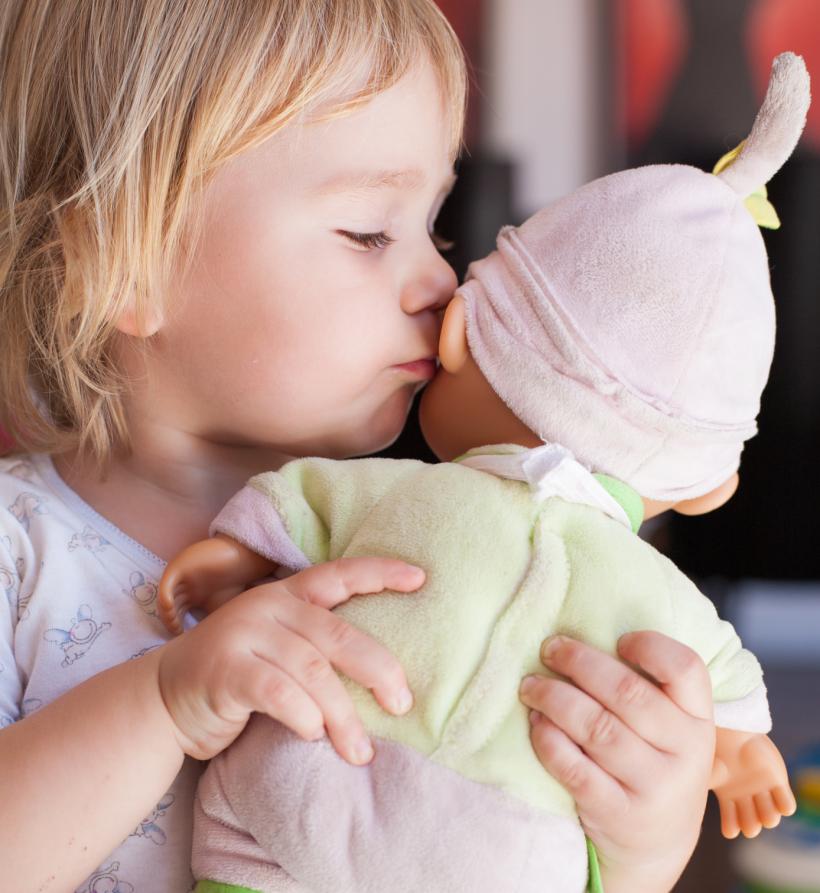
My son likes trains AND princesses. He chose to pair that truck shirt with those butterfly leggings. Image: Thinkstock.
What we say about gender in front of our kids matters.
My son loves cars and trucks and things that go. He is fast and loud and boisterous. Wherever we go, he gets approving comments (“He’s such a boy!”) — sometimes with an eye roll, but still clearly approving.
My son also loves dolls and princess dresses and sparkly wands, and, given a choice, he will always pick out the pink and purple crayons.
But apparently nobody sees that, because nobody ever comments on it. Or if they do, it’s to laugh and say he’s just copying his big sister.
My son is two and a half years old, and so far (thankfully!) he seems to be unaware of what is just around the corner: the realization that those things are “for girls” and, most likely, the abandonment of his current preference for purple pants and pink shoes.
Maybe he’ll continue to play princess at home, but I doubt he’ll choose to take his dolls and wands to daycare.
My son has enough “boy” characteristics — fast, loud, truck-loving — that I don’t think this abandonment of his “girl” toys and clothes will be too hard for him, but it kind of breaks my heart.
What breaks my heart even more are the daily affirmations of his “boyishness” — by well-meaning strangers and self-identified liberal friends alike — with never a positive word about his love for pink.
Yes, he’s always excited to receive truck- and train-themed gifts, but the last time we went to the doctor, he picked a princess sticker over a car sticker, and when I gave him a choice of pink cups or blue cups, he chose the pink.
OK, so maybe it’s not my son I’m worried about. This is bigger than him.
Because my son comes across as so “boyish,” I’m sure many people think I choose to dress him in purple pants and pink shoes out of stubbornness. They assume I’m that man-hating feminist mother who can’t accept that her son is a boyish boy.
No. My son likes trains and princesses. He chose to pair that truck shirt with those butterfly leggings.
He’s not “such a boy,” he’s a child whose many interests have not yet been thwarted by a culture that forces him to pick a team, and before this precious time expires, I wish more people would see and embrace the whole of him.
“Does this really matter?” I hear you asking. If my son loves cars and trucks, if he runs fast and climbs high and asserts himself in the playground, he’ll be fine. He can let those things go without losing himself. He’ll fit in.
OK, so maybe it’s not my son I’m worried about. This is bigger than him.
Every one of those “such a boy” comments make me hurt for all the other kids who hear these comments every day.
Because of the many, many kids who cannot so easily hide the parts of themselves that don’t garner instant approval, knowing looks, happy eye-rolls. Because the culture that celebrates my son’s love of trucks and refuses to acknowledge his love of princesses is the same culture that shames and isolates trans and gender non-conforming kids every day.
When the story about the German dad who wears skirts and nail polish in solidarity with his gender-non-conforming son went viral, my Facebook feed was full of “Best Dad Ever!” comments… from many of the same people who frequently remark that they wish they had a girl so they could buy cute dresses and braid hair, or throw out yet another “boys and their trucks!” comment when my son runs for the tractor at the playground.
Most liberals are quick to assert that of course they would support their kids if they turned out to be trans. That they would happily use their kid’s preferred gender pronoun if they asked.
But that’s not enough.
It’s not enough to support freedom of gender expression for kids in general (but especially transgender kids) while continuing to pretend that the rest of the population fits neatly into the binary categories of “girls” and “boys.”
What we say about gender in front of our kids matters.
When kids hear adults saying that girls wear jewelry and boys love soccer balls, they learn that a boy who wears jewelry is different, a girl who plays soccer is weird, a boy who wears a skirt is wrong.
And then we turn around and wonder why we have to teach them not to bully their peers for being different.
So, sure, tell my son you like his truck shirt — but please compliment his butterfly leggings too. Because it does matter.








